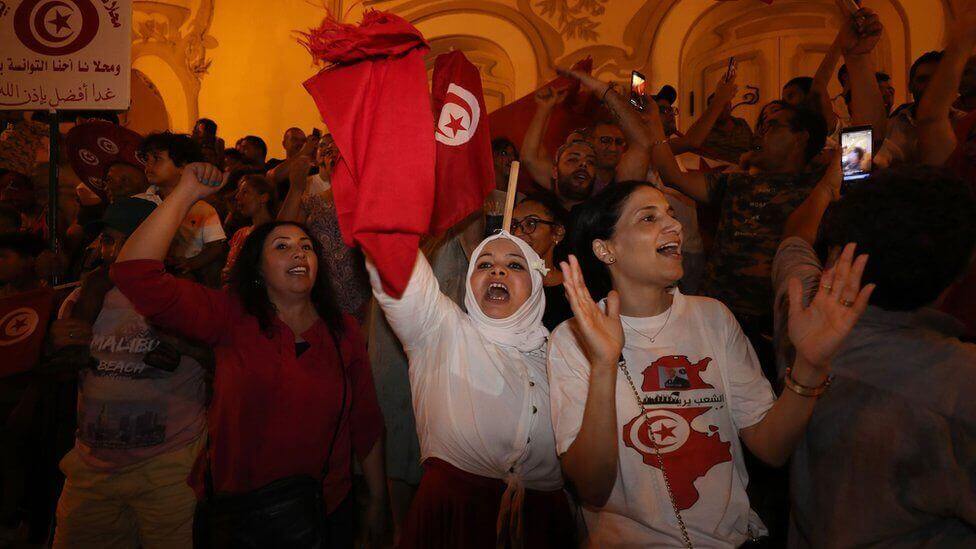Tunisians on Monday voted in favour of President Kais Saied’s proposed constitutional reforms despite an extremely low voter turnout of 27%. An early exit poll by Sigma Conseil reported that 92.3% of voters who decided to cast their ballots approved the new constitution. The referendum was boycotted by almost all major parties, including the Islamist Ennahda.
The first phase of the results will be announced on Wednesday and the final one on August 28. Once notified, the new constitution will officially replace the 2014 document, which was formed in the wake of the 2010 protests that ousted dictator Zine El Abidine Ben Ali. According to experts, once Saied’s constitution becomes law, the President would attain overwhelming political powers, including power over the executive, legislature, and judiciary.
Tunisia (Constitutional referendum) Sigma Conseil exit poll for El Watania:
— Africa Elects (@AfricaElect) July 25, 2022
Yes: 92.3%
No: 7.7%
Estimated turnout: 25%#Tunisia #Tunisie #تونس pic.twitter.com/Akr9C47bXW
The constitution would change Tunisia’s political structure from parliamentary democracy to a presidential one. It would allow Saied to sack and name a new government without parliamentary approval, present and approve draft laws without parliamentary scrutiny, and appoint senior judges. It will also remove Islam as the official state religion.
On Sunday, Saied said at a press conference that the changes are needed to “return the nation to the revolutionary path” and remove corruption. He has previously insisted that Tunisia is ruled by corrupt political parties like Ennahda and accused them of undermining the progress made by the revolution that ousted Ben Ali.
A coup knows no referendum. It knows no free elections.
— Sami Hamdi سامي الهاشمي الحامدي (@SALHACHIMI) July 25, 2022
Saied has unilaterally decreed suspension of Parliament, suspension of constitution, new election laws, new High Judicial Council, and new election laws. He never asked the people. He is certainly not asking now.#Tunisia pic.twitter.com/HKWR45FNfZ
Saied also dismissed concerns of a low turnout, saying it would not affect the referendum’s legality and there was no minimum participation rate. He also rejected claims that the new constitution would undermine the rights and freedoms of Tunisians, declaring, “There is no dictatorship […] this constitution protects [freedoms] and the revolution is defended by people who stand up to those who undermine it.”
Videos circulating on social media showed thousands of people gathered in Tunis in support of Saied and criticising Ennahda. People waved Tunisian flags while driving vehicles and shouted slogans like “Long live Tunisia,” “sovereignty is for the people,” and “the people want to purify the country.”
“We’re not afraid of anything. Only the corrupt and the officials who looted the state will be afraid,” one of Saied’s supporters told Reuters.
Ppl celebrating are raising anti-Nahdha slogans now in front of national theatre pic.twitter.com/fb1ztEa3K7
— Ghaya Ben Mbarek غاية بن مبارك (@Ghaya_BM) July 25, 2022
However, hundreds of Tunisians across the country opposed the referendum. Large-scale protests, led by Ennahda party leaders, were held just hours before the vote. “The most important message we want to convey is that the pro-democracy demonstrators in Tunisia continue to fight against the coup and against all those who want to roll back the revolution and democracy,” remarked senior Ennahda party official Ali Larayedh.
The protesters were met by a harsh police response. Africanews reported that riot police fired water cannons and tear gas at protesters and arrested at least ten protesters.
The National Syndicate of Tunisian Journalists also accused security forces of preventing journalists from performing their duties at several police stations. It noted that both Tunisian and foreign journalists were harassed while covering the referendum.
According to political analyst Marwan Bashara, the new constitution would lead Tunisia towards “populist authoritarianism” and could jeopardise the progress made by the Arab Spring’s sole success story.
Tunisian President Kais Saied arrives to cast his vote in referendum to change country’s constitution. If voted in, Saied will be given sweeping executive powers - while key checks & balances stand to be removed. Today marks 1 year since Saied froze Parliament and dismissed govt pic.twitter.com/6XnWwy7dXa
— Francesca Ebel (@FrancescaEbel) July 25, 2022
Following Ben Ali’s ouster, Tunisia embarked on a path of setting up democratic institutions and held “free and fair” elections in 2011. In 2014, the country adopted a new constitution and its drafters won the Nobel Peace Prize the following year.
Yet, despite the progress, Tunisia is at risk of reversing most political gains made over the last ten years as a result of Saied’s actions, which experts say are aimed at consolidating his grip on power.
In a power grab last July, Saied indefinitely suspended the parliament, dismissed the PM, and lifted the immunity of all lawmakers. The decision was condemned by the opposition, who called it a coup. The Ennahda Party said it was “unconstitutional, illegal, and invalid” and that it marked a “return to dictatorship.”
Since then, rather than trying to return to normalcy, Saied has been taking even further measures to consolidate his position and power, including suspending the constitution, declaring rule by decree, unilaterally appointing a Prime Minister loyal to him, and replacing the country’s independent judicial watchdog. Earlier this month, Saied also sacked 57 judges over alleged corruption charges and passed a new law that further cemented his hold over the judiciary.

